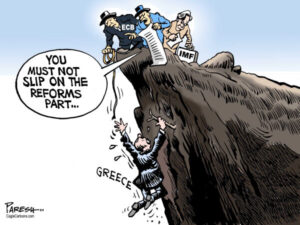The planet earth remains cautiously optimistic that European officials will resolve their differences for their second bailout. At stake is a 130 billion euro ($172 billion) bailout — the second rescue in two years — and a related write-down for private bondholders that aims to knock €100 billion off the country’s debt load. This should happen today. Futures like it, the euro likes it and generally the markets like it.
It looks like they have agreed to agree, but its a long haul. This should be fun.
Here is the timeline from Reuters.
Feb 20
– Euro zone finance ministers (the Eurogroup) to take a decision whether to grant Greece the second financing program.
– This decision will open the way for euro zonecountries to approve higher guarantees for the euro zone’s temporary bailout fund, the European Financial Stability Facility (EFSF), which will need to raise money on the market to finance the bailout.
– Preliminary Eurogroup discussion of whether to allow the 440-billion-euro EFSF and the 500-billion-euro permanent bailout fund, the European Stability Mechanism, to run in parallel, nearly doubling the euro zone’s bailout capabilities.
Feb 21-22
– If the Eurogroup gives its go-ahead on Monday, Greece will be able to launch a debt restructuring offer, inviting private investors to swap around 200 billion euros of Greek government bonds they hold for new ones worth around half as much.
Feb 23-24
– Finnish parliament likely to debate package in order to approve higher EFSF guarantees.
Feb 24-26
– Finance ministers and central bank governors from the world’s 20 biggest economies, meeting in Mexico, to discuss providing more funds for the International Monetary Fund. G20 countries have signaled that they will only agree to increase IMF funds if euro zone countries allow the ESM and the EFSF to run alongside to boost the euro zone’s bailout capacity.
Feb 27
– German parliament to vote on bailout package and use of the EFSF to secure new Greek bonds.
March 1-2
– EU summit, which will decide, among other things, whether to allow the ESM and EFSF to run in parallel, boosting the bailout capacity of the euro zone. Leaders may also be give their imprimatur to the second Greek package.
March 8
– The last day to sign up for Greek bond swap offer.
March 9
– Responses from investors concerning the bond swap offer are processed.
March 10-11
– The actual swapping of Greek bonds for new, longer-dated securities with a lower coupon takes place.
March 12-13
– Euro zone and EU finance ministers meet.
March 20
– Greece is due to repay 14.5 billion euros of debt. If the bond swap goes ahead, this would be covered, meaning Athens will avoid defaulting on this payment.
March 30-31
– Informal meeting of euro zone and EU finance ministers and central bank governors in Copenhagen.
April 20-22
– IMF meeting in Washington on bigger IMF resources.
$SPY, $EURO, $UUP, $QQQ, $IWM $TNA

